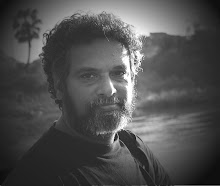Aleykutty Joseph

This morning, as usual, I opened my Bible at random to listen to the sweet whisper of my Abba, my Father God. This is a habit I’ve acquired from my earthly father, who used to believe with a faithful certainty that the Word of God that he received at the profound hours of daybreak would surely have a personal message for him. I too have learned this technique of listening to God thus at the wee hours of dawn. But it took me quite some years to acquire this precious skill – the years it took had the distance from Virginia Woolf to Ruskin Bond – from the dark dungeons of those notions about patriarchal tyranny to the soothing aurora of paternal affection! Yeah, that’s the same distance I had to trudge from Freud and Jung to Viktor Frankl and Stephen Covey. So today, as I opened my Bible, the Word that captured my eyes was a part of a prayer from the Book of Wisdom :
On You they called when they were thirsty
And from the rocky cliff, water was given to them,
From hard stone a remedy for their thirst
Thus what had served to punish their enemies
Became a benefit for them in their difficulties,
Whereas their enemies had only the ever-flowing source
Of a river fouled with mingled blood and mud,
To punish them for their decree of infanticide
You gave your people , against all hope, water in abundance.
(Wisdom 11: 4-7, The New Jerusalem Bible)

My Father’s profound whisper swept over me like a gentle breeze. I highlighted the lines in fluorescent green. I could sense that this Word was in fact decoding for me the mysterious joy ( of course mingled with tears) I experienced as I stood watching an effigy burning last Friday.
We were just coming out of the auditorium (Bharatha Mata College, Kochi) that Friday night,after watching a bewitching drama ‘ Bommanahalliyile Kinnara yogi’ ( a drama adaptation in Malayalam of Kovembu’s re-reading of Pied Piper by ‘Mazhavillu’ children’s theatre.It was part of the cultural evening of the international seminar on 'Re-Reading Classics in Children's Literature', organized by the Dept. of English of Bharata Mata college. ) It was with a great sense of wonder that I watched that beautiful poem on stage, enacted by a troupe of brilliant children. The play began with the chorus, dressed in rural Indian costumes, wailing the aridity of the land and of the various oppressions they suffered under their apathetic ruler the “gowda”. But most of all, they bewailed with an intuitive apprehension arising from their herd instinct, the irksome pestilence of a herd of rats. The aggravating little rodents appeared “shrieking and squeaking” in their black, brown and grey costumes, with conspicuously prominent ears and their extra-large rat faces, which they literally carried in their hands, as though those were some infernal instruments with which they gnawed away the very elements of life.

Into this dark chaos – interposed throughout with every possible humour only children can provide – comes the strange figure of the yogi. He makes his arrival with drummers and singers , giving it the colour of a local temple festival. The painted face of the yogi radiated the needed charm ( the fiery expression on the face of the child artist reminded me of the Malayalam actress Manju Varrier).
Finally , when we thought the drama had ended, the boy who took the role of gowda announced that the drama does not end there. He proclaimed that the responsibility of bringing back the children, whom the yogi had charmed away into some distant lands, lay not only with them, but also with us the audience (decode it as 'adults', if you feel like it) . So with the burden of the responsibility of bringing back the children gnawing at our inner beings, we slowly made our exit. And as we silently stepped on to the front yard of the auditorium, we found them, the children ( Oh, the joy of discovery!). All the actors, with gentle dancing steps, were circling round an effigy, and they were chanting the mesmerizing song of the yogi. Eventually (may I dare to say, “at the fullness of time”), the girl who enacted the yogi’s role came forward from amidst the chanting choir and asked permission from everyone to burn down the effigy. With everyone’s consent the child lit the effigy with a flaming torch and burned it down. Then they all danced away with shouts of joy , turning the whole event into a campfire.

And that was the moment I sensed tears rolling down my cheeks. I realized with a shock that I wasn’t just witnessing a death. In fact I was experiencing the death of many a gnawing vermin within my own being. They fell crackling into ashes. I could almost name some of those creatures that fell dying in my heart – prejudices, irrational fears, pride and its accompanying vices.
And I stood there wondering : “ Whose effigy were we burning , anyway?"
My Father’s profound whisper sweeps over me like a gentle breeze.
"Dreams come true, to those who are faithful", so I mused as I walked out of the gates of Bharathmatha college, Kochi on Friday night.I had just watched the play, "Bommanahallyile Kinnarayogi" a Malayalam adaptation of Kovembu's Kannada play based on Browning's Pied Piper.
courtesy http://eluraj.blogspot.com; photos by Chandradasan from the performance of the play at Swaralaya theatre festival Palakkadu Kerala.
Labels: Bommanahalliyile Kinnara Yogi, Chandradasan, children's Theatre, Lokadharmi, Mazhavillu







